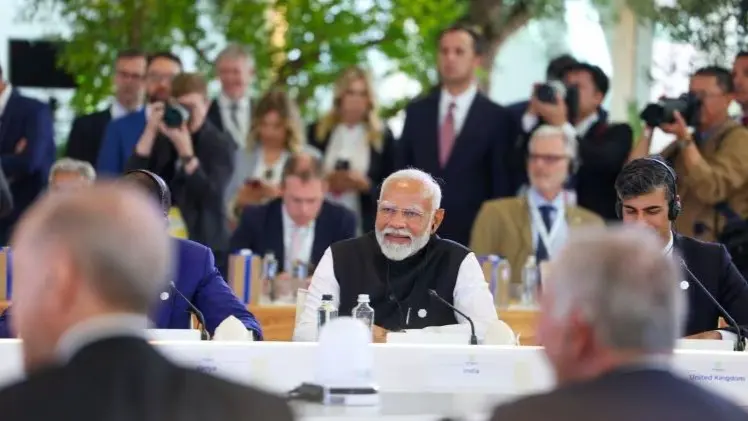Updated 25 August 2024 at 10:34 IST
Opinion/ India's Urge To Sustain Peace: A Pledge To 'Vasudeva Kutumbakam'
India's foreign policy in the 21st century is based on “Vasudev Kutumbakam”, a phrase taken from 'Maha Upanishad' meaning one earth, one family.
- Opinion News
- 3 min read

New Delhi: India believes in sustainability of all kinds whether it is about relationships, resources, energy, or security of the environment. India's foreign policy in the 21st century is based on “Vasudev Kutumbakam”, which is a phrase taken from the Maha Upanishad meaning one earth, one family and one world and that is how we have sustained good and cordial relationships with many nations whether it is on the grounds of history, culture, civilisation political, economy. The recent visit of our Prime Minister Narendra Modi to Poland was of great significance as it reminds the world of the Warsaw Pact also known as the Treaty of Friendship, cooperation, and mutual assistance.
The goal of the pact stated to promote peace and cooperation and to restore and uphold international peace and security. A warm welcome in Poland and the Delegation level of talks pointing to people-to-people contact, science and technology.
Indian democracy was praised by the Prime Minister of Poland who also appreciated India’s role and readiness for a positive and peaceful environment for the world, he also mentioned that India’s visit to Ukraine will be a historic one and of great significance to bring peace. The visit denotes the sustainability of resources and to spread of peace on the way.
'PM's visit to Russia, Poland and Ukraine set the tone for peace'
Visit to Ukraine is also a short one but India can play a positive role and having no difference of opinion is also a good sign. It is a historic visit to Kyiv due to its timing and Modi is the first Indian prime minister to touch the soil of Ukraine. Therefore a well-balanced relationship between Ukraine and Russia and spreading the word of peace and repeatedly mentioning the same that “No solution is possible on the battlefield,“ whether it’s war in Ukraine or Gaza.
Advertisement
Therefore all these visits to Moscow, and now to Poland and Ukraine set the tone for keeping the foundation for peace and have assured a certain level of trust by being the first responder in crisis and sustaining the supply chain by refusing to bow to Western pressure on sanctions against Russia or giving human assistance to Ukraine.
Our external Affairs Minister congratulated Ukraine's Independence Day on 24th August, recognition of one’s Independence and celebration is also a great gesture and also assured of further bilateral cooperation.
Advertisement
However, what India has done is a unique approach towards balancing relations with Russia and Ukraine and this can be viewed through the prism of its serious efforts to reduce the gap between developed and developing countries and to bring in peace by urging for dialogue between them.
Our Prime Minister Modi emphasised that this is “not the time for war” but to preserve the environment and to sustain resources and relations by maintaining peace and stability in this post-globalized world, where non-traditional security threats have become important and transnational, which includes food shortages, energy shortages, climate change and natural disasters, infectious diseases, illegal migration, drug trafficking, human trafficking, cybercrime, terrorism and religious extremism, arms trafficking, etc.
The global challenges of today's world and threats to public security, additionally emphasise the geopolitical ripples of international relations. PM Modi stressed on the importance of 3D’s democracy, diplomacy, and dialogue as the three important poles for peace for lasting stability. India’s long history of promoting and maintaining peace globally through its foreign policy contributes to global peace which is being recognised and respected.
(Dr Vaishali Krishna is an Assistant Professor at Jawaharlal Nehru University's Centre for Russian and Central Asian Studies in New Delhi)
Published By : Ananya Srivastava
Published On: 25 August 2024 at 10:34 IST
